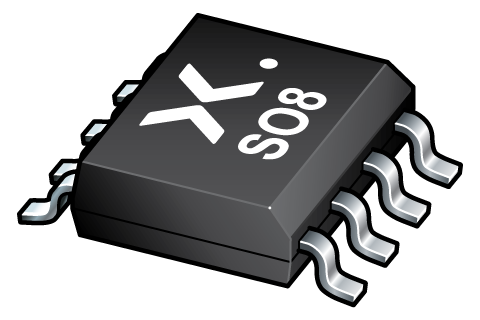
Register once, drag and drop ECAD models into your CAD tool and speed up your design.
Click here for more informationPHK18NQ03LT
N-channel TrenchMOS logic level FET
Logic level N-channel enhancement mode Field-Effect Transistor (FET) in a plastic package using TrenchMOS technology. This product is designed and qualified for use in computing, communications, consumer and industrial applications only.
Features and benefits
- High efficiency due to low switching and conduction losses
- Suitable for logic level gate drive sources
Applications
- DC-to-DC converters
- Notebook computers
- Switched-mode power supplies
- Voltage regulators
Parametrics
| Type number | Package version | Package name | Product status | Channel type | Nr of transistors | VDS [max] (V) | RDSon [max] @ VGS = 10 V (mΩ) | RDSon [max] @ VGS = 4.5 V; @25 C (mΩ) | Tj [max] (°C) | ID [max] (A) | QGD [typ] (nC) | QG(tot) [typ] @ VGS = 4.5 V (nC) | Ptot [max] (W) | Qr [typ] (nC) | VGSth [typ] (V) | Automotive qualified | Ciss [typ] (pF) | Coss [typ] (pF) | Release date |
|---|---|---|---|---|---|---|---|---|---|---|---|---|---|---|---|---|---|---|---|
| PHK18NQ03LT | SOT96-1 | SO8 | End of life | N | 1 | 30 | 8.9 | 12.5 | 150 | 20.3 | 2.5 | 10.6 | 6.25 | 14 | 1.7 | N | 1380 | 290 | 2011-01-05 |
Package
All type numbers in the table below are discontinued.
| Type number | Orderable part number, (Ordering code (12NC)) | Status | Marking | Package | Package information | Reflow-/Wave soldering | Packing |
|---|---|---|---|---|---|---|---|
| PHK18NQ03LT | PHK18NQ03LT,118 (934058815118) |
Obsolete | K18NQ03 |

SO8 (SOT96-1) |
SOT96-1 |
SO-SOJ-REFLOW
SO-SOJ-WAVE WAVE_BG-BD-1 |
SOT96-1_118 |
| PHK18NQ03LT,518 (934058815518) |
Obsolete | K18NQ03 | SOT96-1_518 |
Environmental information
All type numbers in the table below are discontinued.
| Type number | Orderable part number | Chemical content | RoHS | RHF-indicator |
|---|---|---|---|---|
| PHK18NQ03LT | PHK18NQ03LT,118 | PHK18NQ03LT |
|
|
| PHK18NQ03LT | PHK18NQ03LT,518 | PHK18NQ03LT |
|
|
Documentation (18)
| File name | Title | Type | Date |
|---|---|---|---|
| PHK18NQ03LT | N-channel TrenchMOS logic level FET | Data sheet | 2017-06-08 |
| AN10273 | Power MOSFET single-shot and repetitive avalanche ruggedness rating | Application note | 2022-06-20 |
| AN10874_ZH | LFPAK MOSFET thermal design guide, Chinese version | Application note | 2020-04-30 |
| AN11113_ZH | LFPAK MOSFET thermal design guide - Part 2 | Application note | 2020-04-30 |
| AN11158 | Understanding power MOSFET data sheet parameters | Application note | 2025-02-18 |
| AN11158_ZH | Understanding power MOSFET data sheet parameters | Application note | 2021-01-04 |
| AN11160 | Designing RC Snubbers | Application note | 2024-10-21 |
| AN11243 | Failure signature of Electrical Overstress on Power MOSFETs | Application note | 2025-03-20 |
| AN11261 | RC Thermal Models | Application note | 2021-03-18 |
| AN11599 | Using power MOSFETs in parallel | Application note | 2016-07-13 |
| Nexperia_package_poster | Nexperia package poster | Leaflet | 2020-05-15 |
| SO8_SOT96-1_mk | plastic, small outline package; 8 leads; 1.27 mm pitch; 4.9 mm x 3.9 mm x 1.75 mm body | Marcom graphics | 2017-01-28 |
| SOT96-1 | plastic, small outline package; 8 leads; 1.27 mm pitch; 4.9 mm x 3.9 mm x 1.75 mm body | Package information | 2020-04-21 |
| SO-SOJ-REFLOW | Footprint for reflow soldering | Reflow soldering | 2009-10-08 |
| PHK18NQ03LT | PHK18NQ03LT SPICE model | SPICE model | 2012-06-08 |
| TN00008 | Power MOSFET frequently asked questions and answers | Technical note | 2024-08-09 |
| SO-SOJ-WAVE | Footprint for wave soldering | Wave soldering | 2009-10-08 |
| WAVE_BG-BD-1 | Wave soldering profile | Wave soldering | 2021-09-08 |
Support
If you are in need of design/technical support, let us know and fill in the answer form we'll get back to you shortly.
Longevity
The Nexperia Longevity Program is aimed to provide our customers information from time to time about the expected time that our products can be ordered. The NLP is reviewed and updated regularly by our Executive Management Team. View our longevity program here.
Models
| File name | Title | Type | Date |
|---|---|---|---|
| PHK18NQ03LT | PHK18NQ03LT SPICE model | SPICE model | 2012-06-08 |
How does it work?
The interactive datasheets are based on the Nexperia MOSFET precision electrothermal models. With our interactive datasheets you can simply specify your own conditions interactively. Start by changing the values of the conditions. You can do this by using the sliders in the condition fields. By dragging the sliders you will see how the MOSFET will perform at the new conditions set.